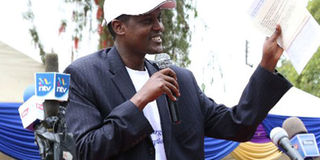War on corruption receives fresh boost after anti-graft agency backs new law

Ethics and Anti-Corruption Commission Chief Executive Officer Halakhe Waqo addresses participants during the International Anti-Corruption Day at Central park in Nanyuki town, Laikipia County, on December 9, 2015. He said proposed laws would also strengthen coordination between various government organs mandated to fight corruption. PHOTO | JOSEPH KANYI | NATION MEDIA GROUP
What you need to know:
- The commission’s Chief Executive Officer Halakhe Waqo said proposed laws would also strengthen coordination between various government organs mandated to fight corruption.
- On the Eurobond saga, Mr Waqo said the EACC will complete questioning National Treasury officials, including Cabinet Secretary Henry Rotich, by the end of the week.
- There is also political goodwill to fight corruption as evidenced by the President’s resolve, said the DP, who said the government is committed to fully supporting the EACC and other agencies in the war against corruption.
The anti-graft agency has bolstered the war on corruption after it supported a new law that seeks to freeze assets of people suspected of corruption prior to obtaining a court order, thus increasing chances of prosecuting perpetrators.
The commission’s Chief Executive Officer Halakhe Waqo said proposed laws would also strengthen coordination between various government organs mandated to fight corruption.
They are part of measures President Kenyatta announced to strengthen the fight against the vice after consultations with the private sector.
Currently, the commission has to obtain a court order to freeze assets of those suspected of graft.
“We will thus be able to hasten our investigations if we can do it directly,” said Mr Waqo. A task force led by Attorney-General Githu Muigai is reviewing the laws.
Mr Waqo was speaking in Nanyuki Town during celebrations to mark the International Anti-Corruption Day at the central park.
On the Eurobond saga, Mr Waqo said the EACC will complete questioning National Treasury officials, including Cabinet Secretary Henry Rotich, by the end of the week.
“We are investigating the whole project, not just individuals. We will question as many people as possible, all those who can add value to our investigations,” he added.
Mr Waqo called on politicians with evidence on the Eurobond to forward it to his office.
Deputy President William Ruto, in a speech read by Mr Waqo, said the government will introduce compulsory and continuous training on ethics and integrity at all levels of the public service.
“This is part of the efforts the government is making in the fight against corruption in addition to the ongoing policy, legal, administrative reforms,” said Mr Ruto.
He added: “The government, through the ministry of Education, Science and Technology, will also ensure values are being taught at every level of our education system.”
Mr Ruto said the government remains committed to her international and regional anti-corruption obligations.
PRESIDENCY MOST CORRUPT
There is also political goodwill to fight corruption as evidenced by the President’s resolve, said the DP, who said the government is committed to fully supporting the EACC and other agencies in the war against corruption.
During the event, leaders urged Kenyans to fight corruption at a personal level and expressed hope that the vice will be eliminated.
“We are ashamed of corruption as Kenyans. Wherever you go across the country, you feel ashamed because of the vice,” said the head of the Anglican Church, Archbishop Eliud Wabukala.
“We can win this war because God cannot just forsake us,” he said, adding that there is need to consolidate efforts against the vice.
“Corruption cases in government departments have proved that the Kenya Police Service may not be the most corrupt institution as has been depicted,” Inspector General Joseph Boinnet said in a speech read on his behalf by Mr Silas Mac Opiyo.
Court of Appeal judge Roselyn Nambuye called on Kenyans to pool efforts to redeem the country’s image, which has been tainted by corruption.
“Kenya has an opportunity to benchmark herself against countries such as South Korea that are free from the vice,” she said.
“Among the weaknesses in the country’s anti-corruption machinery is denying the EACC prosecutorial powers and no matter what efforts it puts into investigations, the Director of Public Prosecutions (DPP) can exercise his discretion and terminate a case,” said the judge.
Laikipia Senator G G Kariuki said the most corrupt institution is the presidency.
The commission had forwarded 117 cases to the DPP which represents a 57 per cent of last year’s 68 files.
Mr Waqo said 352 high profile people have been charged with graft in the past seven months.





